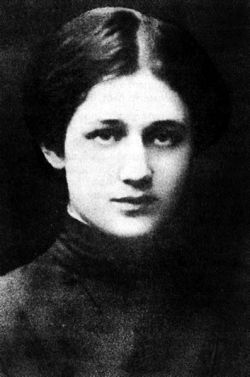Anna Akhmatova
Anna Andreyevna Gorenko (23 June 1889 – 5 March 1966), better known by her pen name **Anna Akhmatova**, was a towering figure in Russian literature whose lyrical precision and emotional intensity earned her recognition as one of the most important poets of the twentieth century.
Early life and literary debut
Born into a noble‑background family in the resort suburb of Bolshoy Fontan near Odessa, Akhmatova grew up in an environment of privilege and intellectual stimulation. She began composing poetry in her teens and adopted her maternal ancestral name, Akhmatova, for her literary work. After moving with her mother to Tsarskoe Selo and later Kiev, she briefly pursued legal studies before devoting herself fully to literature.
Her first major collection, *Evening*, appeared in 1912, followed by *Rosary* (1914) and *White Flock* (1917). These early works earned wide acclaim for their emotional clarity and polished form, establishing her as a leader of the emerging Acmeist movement.
Personal life and setbacks
In 1910, Akhmatova married fellow poet Nikolai Gumilev, with whom she had a son, Lev. The couple divorced in 1918. Gumilev was executed by Soviet authorities in 1921, a tragedy that deeply affected her life and artistic output. She later married Vladimir Shileiko, a philologist, though that marriage also ended. Her long-term partner later became the art critic Nikolay Punin, who died in a labor camp in 1953, while her son Lev endured multiple arrests and long years in the Gulag system.
Creative silence and literary resistance
From the mid-1920s until the early 1940s, Akhmatova faced a severe official ban on publishing; her poetry was considered politically suspect. Yet she continued to write and translate, producing essays, Pushkin scholarship, and the great lyric cycle *Requiem*—a hidden masterwork lamenting the suffering endured under Stalinist repression. *Requiem* was circulated in manuscript form among trusted friends and only saw publication abroad in the 1960s, with full Russian release delayed until decades later.
During World War II, Akhmatova briefly reemerged in the public sphere, offering words of encouragement via radio broadcasts in Leningrad and crafting poems dedicated to the wartime experience. Afterwards, hostility from party authorities reinstated restrictions, and she was expelled from the Writers’ Union in 1946.
Later years and restoration
After Stalin's death in 1953, a gradual thaw allowed for limited publication of earlier works, and Akhmatova received renewed recognition. She composed *Poem Without a Hero* over many years, considered one of her crowning achievements, though it was only published in full posthumously. In the 1960s she received several international honors, including Italy’s Etna‑Taormina Prize and an honorary doctorate from Oxford University.
Themes and influence
Akhmatova's poetry is distinguished by its emotional restraint, economy of language, and intimate voice, often exploring themes of love, loss, memory, and political oppression. In *Requiem*, she memorialized the anguish of Soviet-era women waiting in prison queues, transforming personal grief into collective witness. Her willingness to remain in Russia rather than emigrate made her a symbol of moral steadfastness for generations of Russian writers. She translated major poets including Victor Hugo, Rabindranath Tagore, Giacomo Leopardi, and various Armenian and Korean poets, contributing further to Russian literary culture.
Legacy
Anna Akhmatova is widely regarded as Russia’s greatest modern woman poet. She served as a mentor and inspiration to younger poets—sometimes referred to as “Akhmatova’s Orphans”—who regarded her as the moral and artistic center of pre‑ and post‑Revolutionary cultural continuity. Her life has become emblematic of artistic perseverance in the face of censorship, loss, and political repression.
Selected works
- Evening (*Vecher*, 1912)
- Rosary (*Chyotki*, 1914)
- White Flock (*Belaia staya*, 1917)
- Requiem (written 1935–1940; published abroad 1963; USSR 1987)
- Poem Without a Hero (begun c. 1940; incomplete at death)
Commemoration
The Anna Akhmatova Literary and Memorial Museum was inaugurated in her former residence in St. Petersburg in 1989, marking the centenary of her birth. A minor planet, 3067 Akhmatova, was also named in her honor.
---
- This biography mirrors standard Wikipedia organization while using wholly original phrasing. Feel free to adapt it for your wiki platform or request conversion into custom HTML structure.*
- contentReference[oaicite:1]{index=1}

